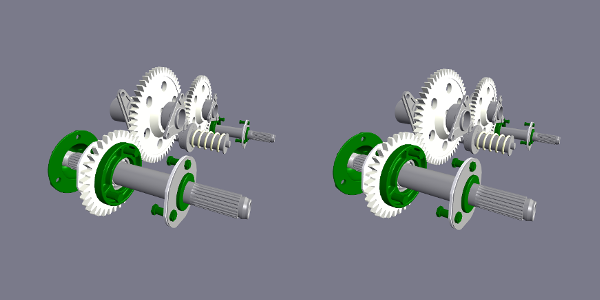Viewport
A Viewport controls the canvas viewport for a Scene.
Overview
- One Viewport per scene.
- You can configure a Scene to render multiple times per frame, while setting the Viewport to different extents on each render.
- Make a Viewport automatically size to its Scene's Canvas
by setting its autoBoundary property
true(default isfalse).
Examples
Usage
Configuring the Scene to render twice on each frame, each time to a separate viewport:
// Load glTF model
var model = new xeogl.GLTFModel({
src: "models/gltf/GearboxAssy/glTF-MaterialsCommon/GearboxAssy.gltf"
});
var scene = model.scene;
var viewport = scene.viewport;
// Configure Scene to render twice for each frame
scene.passes = 2; // Default is 1
scene.clearEachPass = false; // Default is false
// Render to a separate viewport on each render
var viewport = scene.viewport;
viewport.autoBoundary = false;
scene.on("rendering", function (e) {
switch (e.pass) {
case 0:
viewport.boundary = [0, 0, 200, 200]; // xmin, ymin, width, height
break;
case 1:
viewport.boundary = [200, 0, 200, 200];
break;
}
});Constructor
Viewport
-
[owner] -
[cfg]
Parameters:
-
[owner]Component optionalOwner component. When destroyed, the owner will destroy this component as well. Creates this component within the default Scene when omitted.
-
[cfg]optionalViewport configuration
-
[id]String optionalOptional ID, unique among all components in the parent Scene, generated automatically when omitted.
-
[meta]String:Object optionalOptional map of user-defined metadata to attach to this Viewport.
-
[boundary]Array of Number optional -
[autoBoundary=false]Boolean optional
-
Index
Events
Methods
create
-
[cfg]
Convenience method for creating a Component within this Component's Scene.
The method is given a component configuration, like so:
var material = myComponent.create({
type: "xeogl.PhongMaterial",
diffuse: [1,0,0],
specular: [1,1,0]
}, "myMaterial");Parameters:
-
[cfg]optionalConfiguration for the component instance.
Returns:
destroy
()
Destroys this component.
Fires a destroyed event on this Component.
Automatically disassociates this component from other components, causing them to fall back on any defaults that this component overrode on them.
TODO: describe effect with respect to #create
error
-
message
Logs an error for this component to the JavaScript console.
The console message will have this format: [ERROR] [<component type> =<component id>: <message>
Also fires the message as an error event on the parent Scene.
Parameters:
-
messageStringThe message to log
fire
-
event -
value -
[forget=false]
Fires an event on this component.
Notifies existing subscribers to the event, optionally retains the event to give to any subsequent notifications on the event as they are made.
Parameters:
-
eventStringThe event type name
-
valueObjectThe event parameters
-
[forget=false]Boolean optionalWhen true, does not retain for subsequent subscribers
hasSubs
-
event
Returns true if there are any subscribers to the given event on this component.
Parameters:
-
eventStringThe event
Returns:
True if there are any subscribers to the given event on this component.
isType
-
type
Tests if this component is of the given type, or is a subclass of the given type.
The type may be given as either a string or a component constructor.
This method works by walking up the inheritance type chain, which this component provides in property Component/superTypes:property, returning true as soon as one of the type strings in the chain matches the given type, of false if none match.
Examples:
var myRotate = new xeogl.Rotate({ ... });
myRotate.isType(xeogl.Component); // Returns true for all xeogl components
myRotate.isType("xeogl.Component"); // Returns true for all xeogl components
myRotate.isType(xeogl.Rotate); // Returns true
myRotate.isType(xeogl.Transform); // Returns true
myRotate.isType("xeogl.Transform"); // Returns true
myRotate.isType(xeogl.Mesh); // Returns false, because xeogl.Rotate does not (even indirectly) extend xeogl.MeshParameters:
-
typeString | FunctionComponent type to compare with, eg "xeogl.PhongMaterial", or a xeogl component constructor.
Returns:
True if this component is of given type or is subclass of the given type.
log
-
message
Logs a console debugging message for this component.
The console message will have this format: [LOG] [<component type> <component id>: <message>
Parameters:
-
messageStringThe message to log
off
-
subId
Cancels an event subscription that was previously made with Component#on() or Component#once().
Parameters:
-
subIdStringPublication subId
on
-
event -
callback -
[scope=this]
Subscribes to an event on this component.
The callback is be called with this component as scope.
Parameters:
-
eventStringThe event
-
callbackFunctionCalled fired on the event
-
[scope=this]Object optionalScope for the callback
Returns:
Handle to the subscription, which may be used to unsubscribe with {@link #off}.
once
-
event -
callback -
[scope=this]
Subscribes to the next occurrence of the given event, then un-subscribes as soon as the event is subIdd.
This is equivalent to calling Component#on(), and then calling Component#off() inside the callback function.
Parameters:
-
eventStringData event to listen to
-
callbackFunction(data)Called when fresh data is available at the event
-
[scope=this]Object optionalScope for the callback
Properties
autoBoundary
Boolean
Indicates whether this Viewport's boundary automatically synchronizes with the size of the parent Scene's Canvas.
When set true, then this Viewport will fire a Viewport/boundary/event whenever
the Canvas resizes. Also fires that event as soon as this autoBoundary
property is changed.
Fires a autoBoundary event on change.
Default: false
boundary
Array of Number
The canvas-space boundary of this Viewport, indicated as [min, max, width, height].
Defaults to the size of the parent Scene's Canvas.
Ignores attempts to set value when autoBoundary is true.
Fires a boundary event on change.
Default: [size of Scene Canvas]
destroyed
Boolean
True as soon as this Component has been destroyed
model
Model
final
The Model which contains this Component, if any.
Will be null if this Component is not in a Model.
type
String
final
JavaScript class name for this Component.
For example: "xeogl.AmbientLight", "xeogl.MetallicMaterial" etc.
Events
autoBoundary
Fired whenever this Viewport's AutoBoundary/autoBoundary:property property changes.
Event Payload:
-
valueObjectThe property's new value
boundary
Fired whenever this Viewport's boundary property changes.
Event Payload:
-
valueBooleanThe property's new value
boundary
Fired whenever this Viewport's boundary property changes.
Event Payload:
-
valueBooleanThe property's new value
destroyed
Fired when this Component is destroyed.
